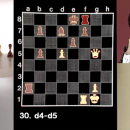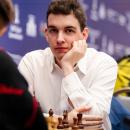GM Nigel Short
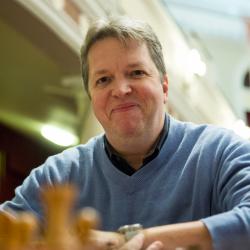
Bio
Nigel Short is one of the best English players in chess history. Three-time British champion, he is best known for qualifying to challenge Garry Kasparov for the world championship in 1993. After Short qualified through FIDE, both players split from the organization to play their match, which Kasparov won.
Early Life And Career
Nigel Short was born in Lancashire, England, in 1965. He learned chess at age five and was very good quickly. In 1976 on one of 30 boards in a simultaneous exhibition performed by Viktor Korchnoi (who went on to challenge Anatoly Karpov for the world championship in 1978 and 1981), Short won.
Short became an IM in 1980 at the age of just 14. Although it is now an age that several players have made not just IM but GM, at the time he was probably the youngest IM ever. (Bobby Fischer and Henrique Mecking may have gotten there sooner, but unassailable records are not available.)

Continued Growth
Still a teenager, Short won his first British Championship in 1984. He made GM the same year.
The next year Short reached his first candidates' tournament by placing fourth in the 1985 Biel Interzonal. Although he finished in only 11th place with a +2 -3 =10 score at the candidates' in Montpellier, France, it would not be his last chance. He reached the next candidates' as well. This time it was a series of matches, and Short defeated Gyula Sax 3.5-1.5 before falling to fellow Englishman Jon Speelman by the same score in the quarterfinals.
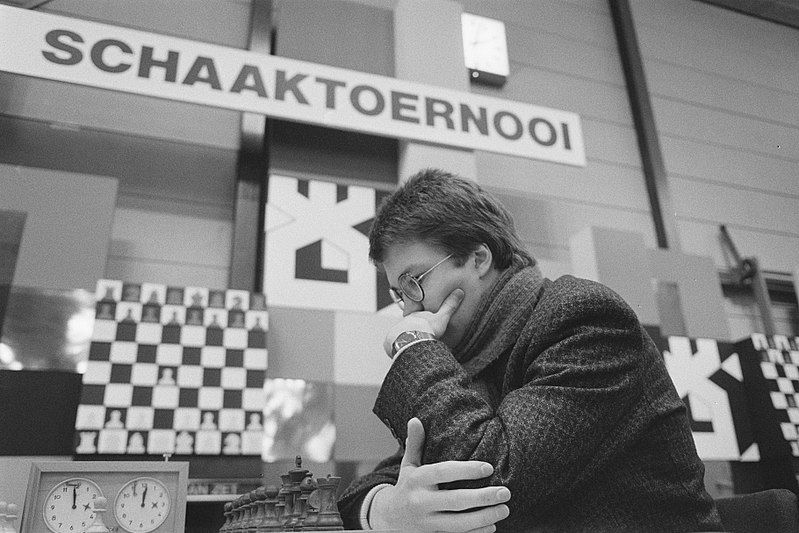
This result was better than the last, but Short wasn’t done yet. In 1990, he placed fourth in the Interzonal to qualify for the next candidates that was played from August 1991 to January 1993.
Also in 1991 Short played arguably his magnum opus against Dutchman Jan Timman. After methodically coming to dominate the dark squares, Short simply marched his king up the board to create a mating net. (See “Best Game” at the end of this biography. And it must be seen!)
Championship Challenger
Short soon played Timman again, this time for the right to challenge Kasparov for the world championship. He had already beaten Speelman 5.5-4.5 in a rematch, followed by a 5-3 match win over future championship challenger Boris Gelfand to reach the semifinals. In the semis, Short found himself matched with the great Karpov, who won 6-4 before toppling Timman in the final, 7.5-5.5.
In the first game against Karpov, Short played the unsound Budapest Gambit and was defeated, but that loss did not set the tone of the match. It was close with more decisive results than draws. Short evened the match in the fourth game, took the lead in game six, and then immediately lost in game seven to even the match again. However, a third straight decisive game went Short’s way.
Because a draw in the ninth game forced Karpov to play for a win with black in the next game just to force a playoff, he played the Sicilian Defense. Karpov never got much play against Short, who eventually reached an endgame with a rook, bishop, and knight against queen. In 10 more moves, Karpov resigned.
The finals of the candidates' with Timman also saw more decisive results than draws. Unlike the Short-Karpov match, Short-Timman featured three wins for Black. After eight games, the match was even, but Short won three of the next four games. A draw in game 13 sent Short to the world championship.
However, Short and Kasparov would not play under the auspices of FIDE due to disagreements with how the world’s chess federation operated. Instead the Professional Chess Association (PCA) was formed. FIDE organized its own championship between Karpov and Timman, but Short had beaten both, rendering that match (which Karpov won) second fiddle. To this day the Kasparov-Short match is considered part of the “classical” championship.
Short could have been, in a sense, Britain’s Bobby Fischer. His match against Kasparov was played in London and created a buzz in the country and on television. Short was also the first player born outside the now-former Soviet Union to play for the world title since Fischer.
Unfortunately, Kasparov in 1993 was a much stronger beast than Boris Spassky in 1972, and Short fell short. Kasparov won five of the first nine games and then went up 10.5-4.5 before Short finally won in the 16th game.
Short did well just to record a victory against Kasparov. Both players, apparently satisfied, drew the next four games, and Kasparov retained the title in just 20 of 24 scheduled games.
After 1993
Short automatically won entry into the PCA candidates' tournament but was crushed in the semifinals by Gata Kamsky 5.5-1.5. Kasparov defended his title against Viswanathan Anand in 1995. Short skipped FIDE’s 1996 cycle, which was the same year when the PCA folded. The next time Kasparov defended his title, the match he lost in 2000 against Vladimir Kramnik, Short was outside of the top 10 by rating and no longer a major world championship contender, although in 1998 he did secure his third British Championship and first in 11 years. (He had also won a one-off English Championship in 1991).
Short did play twice in the FIDE championship tournament in 2002 and 2004. Seeded 22nd in 2002, he lost in the first round to 107th seed Daniel Campora of Argentina. By 2004 Short had worked his way back up to the world’s top 10 and was the sixth seed. This time he won in the first round but was disappointed in the second round against number-59 Michal Krasenkow. With the title reuniting under FIDE auspices in 2006 and the candidates' tournament format returning in 2011, Short never came close to a world title again.
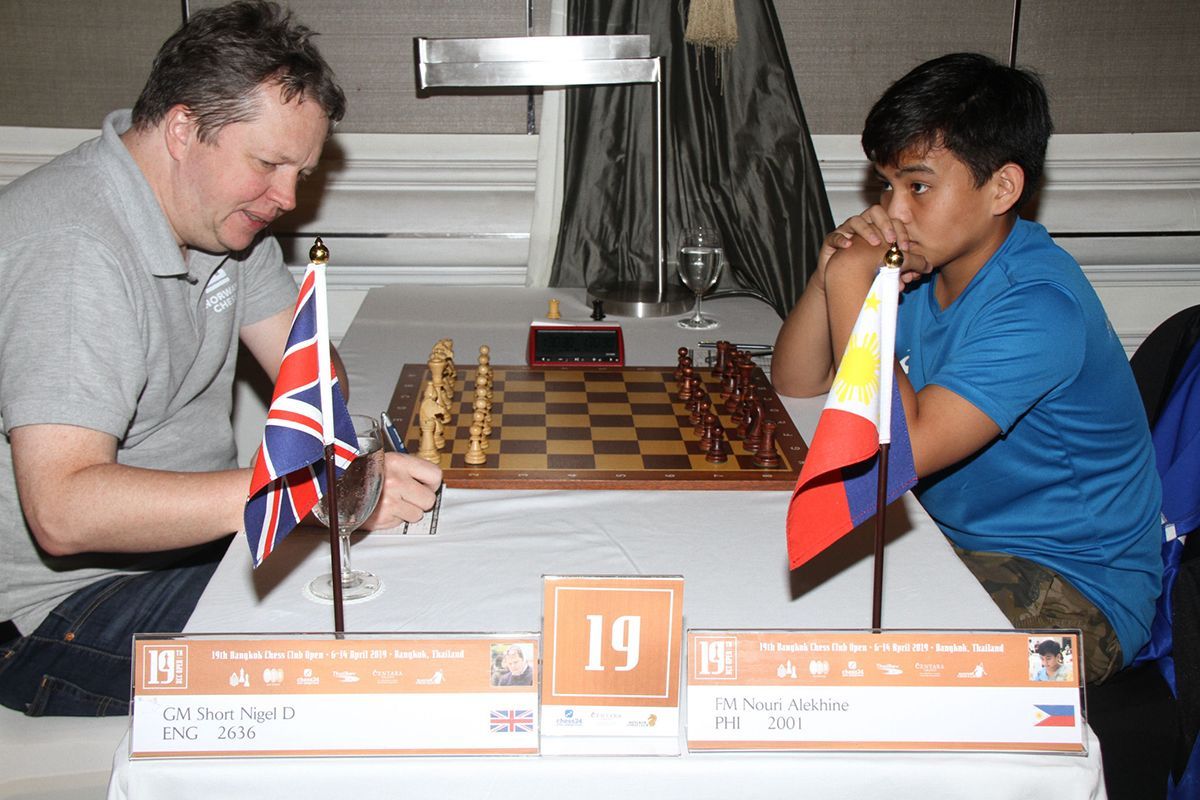
Short ran for FIDE President in 2018 but dropped out just before the October 3 election won by Arkady Dvorkovich. He still plays in a tournament or two a year but, 55 years old as of June 2020, is no longer at the highest levels. However, he remains very active in the chess community in other ways.
Legacy
To date, Short remains the only English chess player to win a candidates' tournament for the undisputed title. Only two others, and only one English-born, have played for any world championship since 1886. Johannes Zukertort, who moved to London in 1872 and would die and be buried there, played against Wilhelm Steinitz in 1886. The other is Michael Adams, who was runner-up in FIDE’s 2004 World Championship. Adams, who won seven British Chess Championships, is one of the few players besides Short (Howard Staunton would be another) to have a case as the best British chess player ever.
Short and Adams were born six years apart, and their careers overlapped significantly, although they met just 16 times in the 1990s and rarely played in the same British Championship. While Adams won that event seven times to Short’s three, they played to a 4-4 score with 15 draws in their standard games against each other. They are certainly two of the three or four top English-born players in history.
Beyond being the relatively rare star chess player from the place of his birth, Short’s legacy includes his success as a youth. Before such achievements became commonplace, he was an IM by 14 and a GM by 19. Both ages made him the youngest in the world at the time he earned the norm. Short may have used this experience to help him when he coached Pentala Harikrishna and Sergey Karjakin for a time in their youths.
Short also made his mark as a columnist and commentator after his very strongest playing days were over. He wrote for at least a year in nearly every major British paper, including the Times, Telegraph, Mail, Spectator, and Guardian. He has never been afraid to share his opinion or pass on knowledge.
Nigel Short is certainly one of the top names in British chess history and will remain so for a long time. His victory in the 1993 Candidates' Tournament ensures that he will be remembered in world chess as well.
